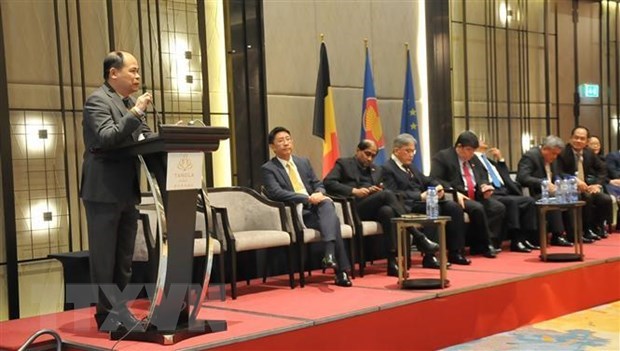EVFTA to create new opportunities for Vietnam: official
- Shrimp exports set to capitalise on EVFTA opportunities
- EVFTA to represent new value chains for Vietnam
In an interview granted to the Vietnam News Agency (VNA), Nguyen Canh Cuong, Vietnamese trade counsellor in Belgium and the European Union, pointed out that apart from garment-textiles and footwear that account for over 10 percent of the market share in the EU, other Vietnamese products make up only from 3 percent to 5 percent of the market share.
Thanks to the deal, Vietnamese consumers will have more options, he said, adding that products of Vietnam and the EU are supplementary.
 |
| Nguyen Canh Cuong, Vietnamese trade counsellor in Belgium and the European Union (Photo: VNA) |
Besides, investors from other countries will have to compete with those from Europe in the Vietnamese market, and such competition would benefit the local economy, Cuong noted.
The EVFTA and the EU-Vietnam Investment Promotion Agreement (EVIPA), which are set to be signed in Hanoi on June 30, will offer more opportunities to European enterprises to access the Vietnamese market with their rights and interests protected better.
They, together with Vietnamese firms, will create new production capacity and competitive edge, he stressed.
Moreover, domestic businesses will have more chances to access European technologies, standards and management methods to raise productivity, quality and competitiveness.
The trade pact will also enable Vietnam to step up the export of tra fish and shrimp to the EU in the time ahead, he said, mentioning some Vietnamese firms’ plan to ship chicken to the market.
This would be a good direction as the EU has great demand for chicken. However, the businesses should invest in material facilities to meet regulations on food safety and hygiene, Cuong said.
He warned that the EU may issue stricter regulations on food safety in the future and urged Vietnamese firms to prepare for that.
European partners can transfer technologies or inject investments to help agricultural producers in developing countries to satisfy food safety requirements set by the EU, according to the official.
Vietnamese businesses, especially small-and medium-sized enterprises, should set up partnerships with EU enterprises on the basis of trust and friendliness, he suggested.

